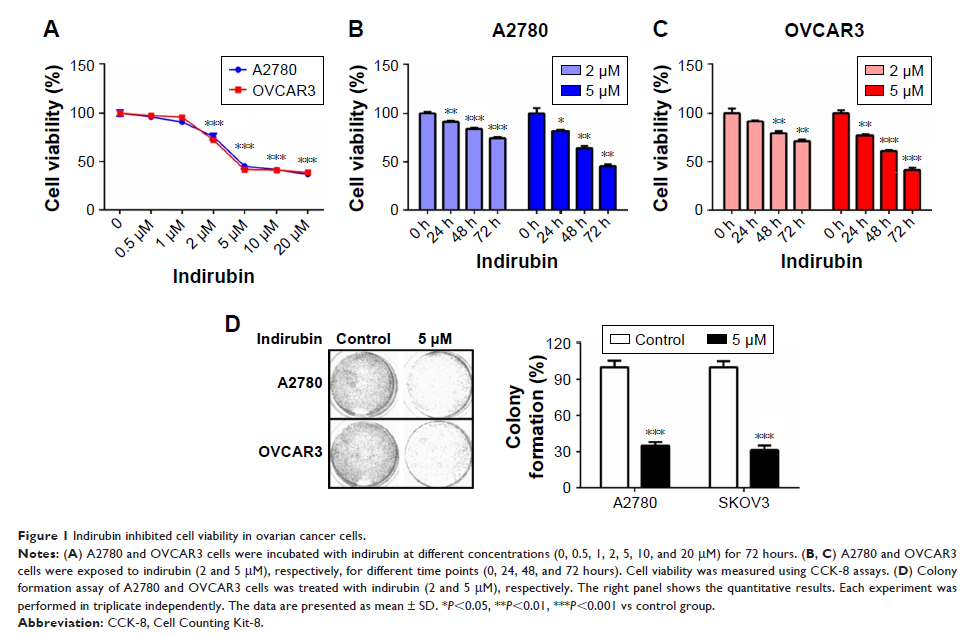108552
论文已发表
注册即可获取德孚的最新动态
IF 收录期刊
- 3.4 Breast Cancer (Dove Med Press)
- 3.2 Clin Epidemiol
- 2.6 Cancer Manag Res
- 2.9 Infect Drug Resist
- 3.7 Clin Interv Aging
- 5.1 Drug Des Dev Ther
- 3.1 Int J Chronic Obstr
- 6.6 Int J Nanomed
- 2.6 Int J Women's Health
- 2.9 Neuropsych Dis Treat
- 2.8 OncoTargets Ther
- 2.0 Patient Prefer Adher
- 2.2 Ther Clin Risk Manag
- 2.5 J Pain Res
- 3.0 Diabet Metab Synd Ob
- 3.2 Psychol Res Behav Ma
- 3.4 Nat Sci Sleep
- 1.8 Pharmgenomics Pers Med
- 2.0 Risk Manag Healthc Policy
- 4.1 J Inflamm Res
- 2.0 Int J Gen Med
- 3.4 J Hepatocell Carcinoma
- 3.0 J Asthma Allergy
- 2.2 Clin Cosmet Investig Dermatol
- 2.4 J Multidiscip Healthc

靛玉红通过 STAT3 信号通路抑制卵巢癌细胞活力
Authors Chen L, Wang J, Wu J, Zheng Q, Hu J
Received 18 May 2018
Accepted for publication 16 July 2018
Published 4 October 2018 Volume 2018:12 Pages 3335—3342
DOI https://doi.org/10.2147/DDDT.S174613
Checked for plagiarism Yes
Review by Single-blind
Peer reviewers approved by Dr Colin Mak
Peer reviewer comments 3
Editor who approved publication: Dr Qiongyu Guo
Background: Indirubin is the active component of Danggui Longhui Wan, a
traditional Chinese medicine formulation. Due to its anti-inflammation and
anti-tumor effects, indirubin has been widely used for the treatment of
inflammation, cancer, and other chronic disease. Herein, we aimed to
investigate the role and mechanism of indirubin in human ovarian cancer cell
proliferation.
Materials and
methods: The cell viability was determined by
Cell Counting Kit-8 and colony formation assays by treatment with different
dosages of indirubin over 72 hours. Apoptosis was examined by flow cytometry
with fluorescein isothiocyanate Annexin V Apoptosis Detection Kit. Western blot
assay was finally applied to analyze the expression of cancer-related STAT3
pathway and its downstream proteins.
Results: Indirubin was found to significantly inhibit cell viability and
induce apoptosis in 2 human ovarian cancer cell lines. Mechanistic studies
revealed that indirubin treatment led to reduced levels of
phosphorylated-STAT3, thus repressing the downstream pro-survival proteins and
elevating pro-apoptosis ones.
Conclusion: Our study provided the evidence for anti-survival activity of indirubin
by inhibiting cell viability and inducing apoptosis in human ovarian cancer
cells, which involved impaired STAT3 signaling pathway. Our findings further
support indirubin as a potential drug candidate against human ovarian cancer.
Keywords: indirubin, ovarian cancer, cell viability, STAT3 signaling
